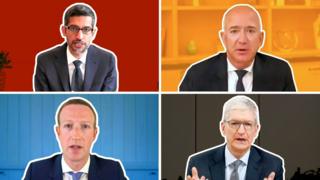Five key moments from the big tech grilling
 Image copyright Reuters
Image copyright Reuters The heads of Amazon, Apple, Facebook and Google owner Alphabet appeared before US lawmakers on Wednesday night to defend their companies against claims they abuse their power to squash competitors.
Here are five key moments from the hearing.
1. Mark Zuckerberg’s emails revealed
Did Facebook buy Instagram in 2012 to neutralise a threat? That was the topic raised by Democratic representative Jerry Nadler.
Emails between Facebook chief executive Mark Zuckerberg and his chief financial officer David Ebersman were revealed as part of the hearing.
In one, Mr Zuckerberg said: «These businesses are nascent but the networks established, the brands are already meaningful, and if they grow to a large scale they could be very disruptive to us… I’m curious if we should consider going after one or two of them.»
Mr Ebersman asked if Mr Zuckerberg hoped to «neutralise a potential competitor».
Mr Zuckerberg replied it was a combination of that and hoping to improve Facebook’s services.
In a follow-up email, he added: «I didn’t mean to imply we’d be buying them to prevent them from competing with us in any way».
The slide presenting this email to Congress was titled «Whoops!», tech news site the Verge reported.
At Wednesday’s hearing, Mr Zuckerberg said several international regulators – including the US Federal Trade Commission – had investigated the takeover at the time, and had decided not to block it.
In another email, he had said it would be a while before Facebook could afford to buy Google. At the hearing, Mr Zuckerberg said the comment was a joke.
2. Apple defends its 30% app cut
Democratic congressman Henry Johnson raised concerns about Apple’s App Store, suggesting its rules were sometimes «changed to benefit Apple at the expense of [third-party] developers» and also discriminated between different creators.
«Sir, we treat every developer the same,» Apple chief executive Tim Cook responded.
«We have open and transparent rules… we do look at every app before it goes on. But those apps, those rules apply evenly to everyone.»
But emails between Apple senior vice president Eddy Cue and Amazon’s Jeff Bezos showed that Apple agreed to halve its App Store commission to 15% to get Amazon’s Prime Video onto its platform.
In April 2020, Apple introduced a scheme that let video-streaming platforms avoid the 30% fee if they integrated with other Apple products, as news site Bloomberg reported. Amazon is part of this deal.
In another email, sent a decade ago, Mr Cue suggested Apple could take a 40% cut rather than 30%.
«In the App Store’s more than 10-year history, we have never raised the commission or added a single fee. In fact, we’ve reduced it for subscriptions and exempted additional categories of apps,» Mr Cook told the hearing.
3. Republicans accuse the tech giants of bias
Several Republicans made allegations of anti-conservative bias on social media.
Republican congressman Jim Sensenbrenner asked Mark Zuckerberg why Twitter had removed a post by the US president’s son, Donald Trump Jr, discussing the efficacy of the drug hydroxychloroquine.
Twitter is not owned by Facebook.
«I think what you might be referring to happened on Twitter, so it’s hard for me to speak to that,» said Mr Zuckerberg.
However, he added that Facebook did remove posts that could be directly harmful to people.
Republican congressman Jim Jordan suggested Google might tailor its features to aid Joe Biden’s presidential campaign.
«Can you assure us you are not going to silence conservatives and… you’re not going to configure your features [to favour] Joe Biden?» asked Mr Jordan.
«You have my commitment. It’s always been true and we’ll continue to conduct ourselves in a neutral way,» replied Google’s chief executive Sundar Pichai.
Democrat Mary Gay Scanlon suggested Mr Jordan had been pushing «fringe conspiracy theories».
Mr Jordan reacted with fury, saying: «We have the email – there were no fringe conspiracies.»
Later, Republican representative Greg Steube was teased online for asking Mr Pichai why his campaign emails were being marked as spam in Gmail.
4. Amazon dodges a ‘simple’ yes-or-no question
Democratic congresswoman Pramila Jayapal asked Jeff Bezos for a «yes or no» answer: Did Amazon ever use seller data to make its own business decisions?
This was a reference to reports that Amazon has used data gathered from businesses selling products via its site to design and price its own rival first-party goods – something the firm has previously suggested had been limited to a group of rogue employees.
Mr Bezos responded that he couldn’t give an answer in such simple terms.
«What I can tell you is we have a policy against using seller-specific data to aid our private-label business, but I can’t guarantee you that that policy has never been violated,» he said.
Mr Bezos was not asked any questions for the first hour of the hearing, and was seen on the video call eating a snack.
He did get in one zinger near the end of the hearing, which may have been aimed at Mr Zuckerberg.
«It appears to me that social media is a nuance-destruction machine, and I don’t think that’s helpful for democracy,» the Amazon founder said.
5. Google accused of working with China
Republican congressman Matt Gaetz claimed that Google collaborates with Chinese universities that take «millions upon millions of dollars from the Chinese military» and noted that tech investor Peter Thiel had previously accused the company of «treason».
Sundar Pichai denied that his employees were acting against American interests.
«We are not working with the Chinese military, it’s absolutely false,» he said.
«What we do in China, compared to our peers, it’s very very limited in nature. Our AI work in China is limited to a handful of people working on open-source projects.»
The four bosses were also asked a yes-or-no question by Republican Greg Steube: «Do you believe the Chinese government is stealing technology from US companies?»
Tim Cook said: «I don’t know of specific cases where we have been stolen from by the government.»
Sundar Pichai first responded that he had «no first-hand knowledge of any information stolen from Google in this regard,» but later asked to correct the record as he remembered there had been a «well-publicised cyber-attack» originating from China.
Mark Zuckerberg said: «I think it’s well documented that the Chinese government steals technology from US companies.»
Jeff Bezos responded: «I haven’t seen that personally but I’ve heard many reports of it.»



